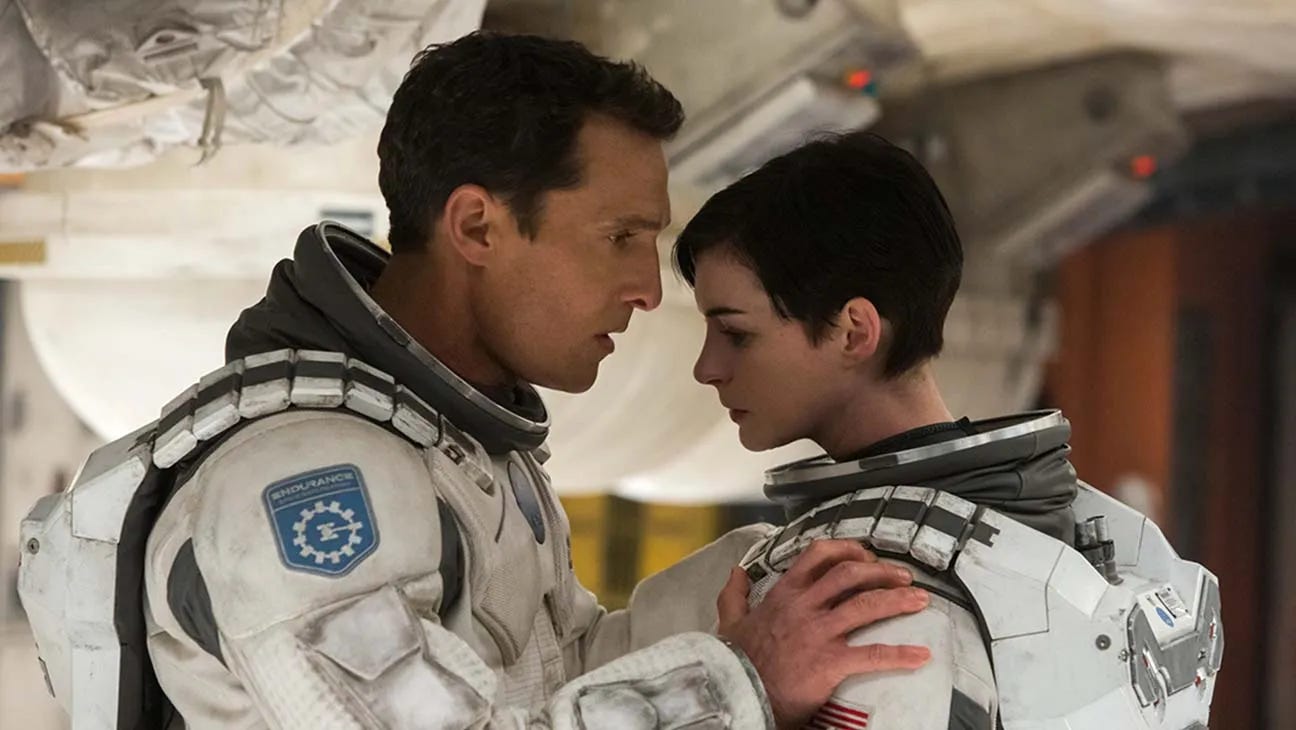Christopher Nolan, the master craftsman of the film landscape has long been the gift that keeps on giving—recent Academy Award-winning Oppenheimer being just one example. Many of his films are a subversion of the genre they belong to, unpredictable and engrossing. Interstellar is such a film, vivid and thrilling accompanied by a score that enjoys as much reverence as the picture itself. Interstellar takes us on a journey through the cosmos, through wormholes and singularities into the very heart of what encapsulates the human experience. It’s a film that confronts you with the realisation of our very fragile place in the universe, engendering an appreciation for the place we call home and those we share it with. While it is a film that undoubtedly belongs to the sci-fi genre, it’s first and foremost a declaration of the human spirit and the power of love.
Nolan presents us with a different take on love in comparison to the conventional sci-fi which tends to see love as secondary to logic and utility. However, the sci-fi that Nolan presents to us shows that love can actually triumph over what appears to be the rational choice. Brand’s (Anne Hathaway) impassioned speech about love encapsulates this - “Love isn’t something we invented - it’s observable, powerful. It has to mean something.” This sentiment reverberates throughout the film. Even when logic and utility dictate the decisions of the characters, Nolan repeatedly suggests love as the better choice. Love may be something beyond empirical understanding, but it’s the driving force behind resolution in Interstellar.
Brand’s romantic argument is dismissed in favour of going to the more logical, more promising destination, Dr Mann’s (Matt Damon) planet. Dr Mann serves as an antithesis to Cooper who has sacrificed all for the love of his children. Dr Mann has been so bereft of connection and human interaction that he fabricates a selfish fiction in order to orchestrate his own rescue and ensure his survival. It is isolation and the lack of connection which Nolan suggests leads to moral decay and the creation of a villain. A lack of love creates the monster.
Where Dr Mann serves as an antagonist to the characters, time could be said to be a direct adversary to the film’s theme of love. We see the relationships stretched to their breaking points. We see the development of Murph and Coop’s father-daughter relationship. His absence understandably fosters resentment in her but the love is never truly gone or diminished. Cooper’s intentions are constantly borne back to his children in the name of love. Time may warp and complicate love in Interstellar, but it invariably endures showing that perhaps it is as powerful as Brand claims.
Interstellar diverges from the traditional scientific approach to an emotion like love being irrelevant and makes it so much more than romantic notion or human fantasy. Nolan presents love as an essential force that transcends the dimensions of time and space. Love is not merely an idea in Interstellar but a tangible power at work that surpasses understanding. Murph solves the gravity equation only after Cooper’s sacrifice, throwing himself into the unknown darkness of a black hole. The transmission of such knowledge is only enabled through the medium of love. Nolan provides us with an idea of love as being the foundation for all discovery and salvation, not just an ethereal human emotion but of something solid and observable, as real as gravity itself.
The maddening yet profound conclusion of the film reinforces love as the dominant force in the universe. Through time and space, love remains the universal constant. Love is what propels Cooper and his cohort of brilliant minds into the void, compelling them to confront the dangers of the vast unknown. Exploration is a central theme of the film - the will of the human spirit to discover and survive - but it is love that brings the explorers home. In Interstellar, the culmination of exploration is to arrive where we started and to know the place for the better. It shows us that love will always bear us back. We get an ending that affirms that no distance can truly hinder our connections, that time may bludgeon chance and hasten demise but love - intrinsic, and unquantifiable - transcends all dimensions and barriers, perhaps offering something scientific afterall.
Want to write for us?
Send a pitch to Amy, our Editor-In-Chief: amyalexanderbusiness@gmail.com






